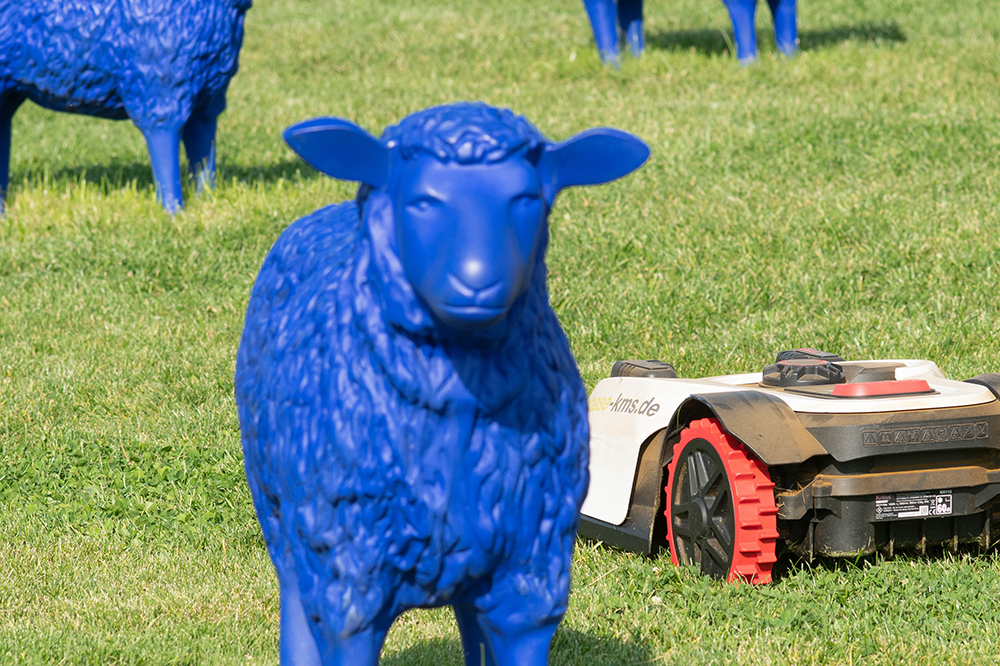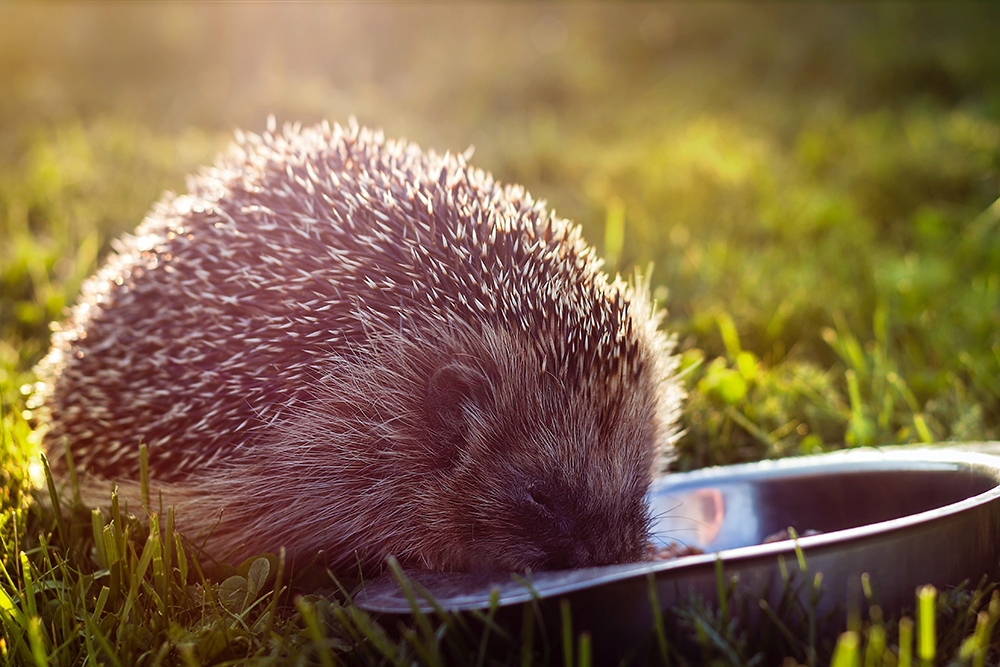Sophie Lund Rasmussen and her co-authors published the interesting and enlightening article “Wildlife Conservation at a Garden Level: The Effect of Robotic Lawn Mowers on European Hedgehogs (Erinaceus europaeus)” in April 2021. In their “Simple Summary” they write: “Injured European hedgehogs are frequently admitted to hedgehog rehabilitation centres with different types of cuts and injuries. Although not rigorously quantified, a growing concern is that an increasing number of cases may have been caused by robotic lawn mowers. Research indicates that European hedgehogs are in decline. It is therefore important to identify and investigate the factors responsible for this decline to improve the conservation initiatives directed at this species. Because hedgehogs are increasingly associated with human habitation, it seems likely that numerous individuals will encounter several robotic lawn mowers during their lifetimes. Consequently, this study aimed to describe and quantify the effects of robotic lawn mowers on hedgehogs, and we tested 18 robotic lawn mowers in collision with dead hedgehogs. Some models caused extensive damage to the dead hedgehogs, but there were noteworthy differences in the degree of harm inflicted, with some consistently causing no damage. None of the robotic lawn mowers tested was able to detect the presence of dead, dependent juvenile hedgehogs, and no models could detect the hedgehog cadavers without physical interaction. We therefore encourage future collaboration with the manufacturers of robotic lawn mowers to improve the safety for hedgehogs and other garden wildlife species.” (Rasmussen et al. 2021) In 2019/2020, Oliver Bendel and his team developed the prototype HAPPY HEDGHEHOG. This robot lawnmower stops working as soon as it detects hedgehogs. A thermal recognition sensor and a camera with image recognition are used. The paper was presented at the AAAI Spring Symposia in March 2021.
Robots that Spare Animals
Semi-autonomous machines, autonomous machines and robots inhabit closed, semi-closed and open environments, more structured environments like the household or more unstructured environments like cultural landscapes or the wilderness. There they encounter domestic animals, farm animals, working animals, and wild animals. These creatures could be disturbed, displaced, injured, or killed by the machines. Within the context of machine ethics and social robotics, the School of Business FHNW developed several design studies and prototypes for animal-friendly machines, which can be understood as moral and social machines in the spirit of these disciplines. In 2019-20, a team led by Prof. Dr. Oliver Bendel developed a prototype robot lawnmower that can recognize hedgehogs, interrupt its work for them and thus protect them. Every year many of these animals die worldwide because of traditional service robots. HAPPY HEDGEHOG (HHH), as the invention is called, could be a solution to this problem. This article begins by providing an introduction to the background. Then it focuses on navigation (where the machine comes across certain objects that need to be recognized) and thermal and image recognition (with the help of machine learning) of the machine. It also presents obvious weaknesses and possible improvements. The results could be relevant for an industry that wants to market their products as animal-friendly machines. The paper “The HAPPY HEDGEHOG Project” is available here.
The Robot Called HAPPY HEDGEHOG
The paper “The HAPPY HEDGEHOG Project” by Prof. Dr. Oliver Bendel, Emanuel Graf and Kevin Bollier was accepted at the AAAI Spring Symposia 2021. The researchers will present it at the sub-conference “Machine Learning for Mobile Robot Navigation in the Wild” at the end of March. The project was conducted at the School of Business FHNW between June 2019 and January 2020. Emanuel Graf, Kevin Bollier, Michel Beugger and Vay Lien Chang developed a prototype of a lawn mowing robot in the context of machine ethics and social robotics, which stops its work as soon as it detects a hedgehog. HHH has a thermal imaging camera. When it encounters a warm object, it uses image recognition to investigate it further. At night, a lamp mounted on top helps. After training with hundreds of photos, HHH can quite accurately identify a hedgehog. With this artifact, the team provides a solution to a problem that frequently occurs in practice. Commercial robotic mowers repeatedly kill young hedgehogs in the dark. HAPPY HEDGEHOG could help to save them. The video on informationsethik.net shows it without disguise. The robot is in the tradition of LADYBIRD.
Another Animal-friendly Machine
Between June 2019 and January 2020 the project HAPPY HEDGEHOG (HHH) was implemented at the School of Business FHNW. Initiator and client was Oliver Bendel. In the context of machine ethics, the students Emanuel Graf, Kevin Bollier, Michel Beugger and Vay Lien Chang developed the prototype of a lawnmower robot that stops working as soon as it discovers a hedgehog. HHH has a thermal imaging camera. If it encounters a warm object, it further examines it using image recognition. At night a lamp mounted on top helps. After training with hundreds of photos, HHH can identify a hedgehog quite accurately. Firstly, another moral machine has been created in the laboratory, and secondly, the team provides a possible solution to a problem that frequently occurs in practice: commercial lawnmower robots often kill baby hedgehogs in the dark. HAPPY HEDGEHOG could help save them. The video on youtu.be/ijIQ8lBygME shows it without casing; a photo with casing can be found here. The robot is in the tradition of LADYBIRD, another animal-friendly machine.
Happy Hedgehog
Between June 2019 and January 2020, the sixth artifact of machine ethics will be created at the FHNW School of Business. Prof. Dr. Oliver Bendel is the initiator, the client and – together with a colleague – the supervisor of the project. Animal-machine interaction is about the design, evaluation and implementation of (usually more sophisticated or complex) machines and computer systems with which animals interact and communicate and which interact and communicate with animals. While machine ethics has largely focused on humans thus far, it can also prove beneficial for animals. It attempts to conceive moral machines and to implement them with the help of further disciplines such as computer science and AI or robotics. The aim of the project is the detailed description and prototypical implementation of an animal-friendly service robot, more precisely a mowing robot called HAPPY HEDGEHOG (HHH). With the help of sensors and moral rules, the robot should be able to recognize hedgehogs (especially young animals) and initiate appropriate measures (interruption of work, expulsion of the hedgehog, information of the owner). The project has similarities with another project carried out earlier, namely LADYBIRD. This time, however, more emphasis will be placed on existing equipment, platforms and software. The first artifact at the university was the GOODBOT – in 2013.




